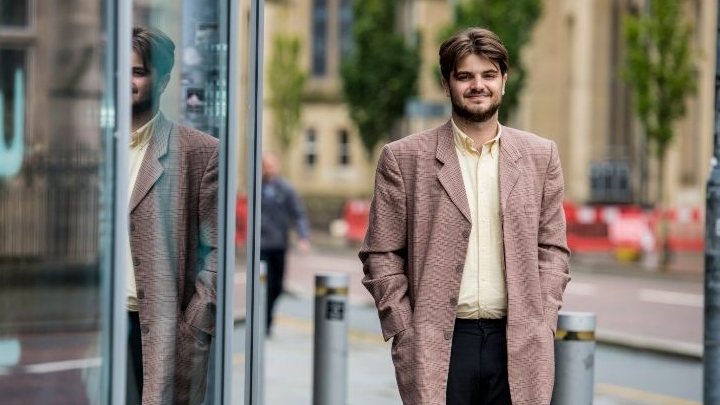Tackling Climate Change: Matthew Petinaud’s Next Step
The next step 6th December 2021
Matt Petinaud, an Environmental Science graduate, has made his dreams of preventing climate change and preserving the environment a nine-to-five reality.

This article is an edited version that originally appeared on the Manchester Evening News.
Tackling climate change
With so much work being done to tackle the climate crisis, it’s no surprise that the University’s students are inspired to do the same.
After graduating from his Bsc in Environmental Science, Matt Petinaud has made his dream to tackle climate change an everyday reality.
Now a Carbon and Energy Consultant at Envantage in Didsbury, Matt grew up with a close connection to nature. When he was little, his grandad would collect animal cards for him, which he would then organise in a big folder and teach himself about different species, their ecosystems, and how they could be preserved and protected.
Matt’s passion for the natural world led to him pursuing a career that would allow him to protect the natural environment on both a local and global level.
“I have always been incredibly passionate to give back to the places that have given me so much throughout my life,” Matt said.
“The most rewarding element of my job is the ability to help people in what we all know is the biggest global challenge we will ever face. However minor it may be at the moment, to be able to contribute to the changes that need to be made, is incredible.
“I hope my contributions can be even greater in the future, but for now I’m happy to be playing my part.”
Climate change is a global emergency that impacts us all, but Matt hopes that with awareness and a collaborative effort to make a change, there’s hope for our futures yet.
A greener future for Greater Manchester
Ahead of the COP26 event in Glasgow this year, which will see world leaders come together to take decisive action on the climate emergency, Matt explained how his everyday role contributes towards a healthier, greener future for the people of Greater Manchester and beyond.
“As we all know, Manchester is known for its industrial and manufacturing background, it’s what built the city in a way,” he said.
“One thing that is becoming more evident is with increased production and output comes negative environmental consequences.
“So, in terms of my role and what I do every day, we work with manufacturers and industries to help quantify their energy usage and the associated carbon emissions that come with that and help to reduce them in the short and long term.
“How that helps benefit the people of Greater Manchester explicitly is that it helps typically, very intensive industries to reduce their carbon emissions, which has all sorts of positive impacts on things such as air quality, the things we take for granted.
“It helps make corporations aware of their emissions and make environmental considerations, going forward. We work with a number of clients on carbon disclosure projects, where we assist big companies as they quantify their carbon emissions and then work with them to help them assess how they can reduce their emissions in both the short and long term by making positive changes to every stage of their process, even down to how they package products.”

Matt’s time in Manchester
While Matt has always been passionate about nature and the natural environment, he feels that studying at The University of Manchester has only served to add to this passion and turn it into a career.
Matt said: “During my time at the University, I was invited to take part in a competition, where you were asked to write 2,000 words on what oil and gas companies can do to reduce their carbon footprints. I started to come up with some ideas and formulated an essay, and then I was told I had won and was invited to take part in a summer internship with BP within their environmental department.”
“During my time there, I helped them draw up risk assessments and environmental best practice tools for the future. For example, we were looking into how companies that transport goods via sea routes can unintentionally pick up animals on the bottom of their boats or on a piece of equipment.”
“They are then, unwittingly, transported halfway across the world, and the animal is dropped into a completely new environment. In some conditions, the animal can thrive and even outcompete the native population. I was working on plans to help prevent that from happening in the future.
“This is a perfect example of how my education at the University piqued my interest in one area, but then it led to something else which has helped me become a better-rounded environmental professional.
“The University has helped me to gain contacts from an industry that I never thought I’d be remotely interested in and have truly provided a platform on which I can succeed. Without their help and support, the opportunities I have been fortunate enough to experience would never have happened.”
Read our blog for more information on how our graduates have gone on to tackle Climate Change, as well as go into many other career paths.
You can also read more about how remarkable graduates across the University are helping to build a greater Manchester on our alumni pages.

Leave a Reply